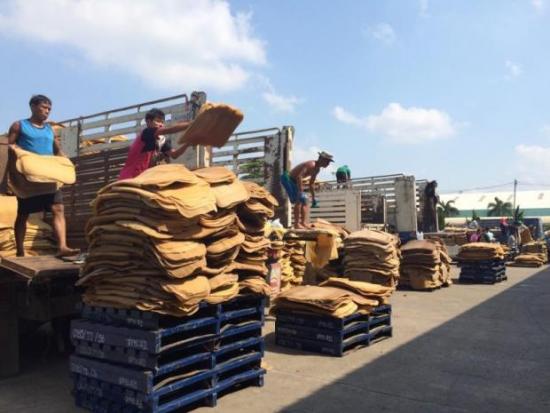Rubber prices are expected to rise to 60 baht a kilogramme in the first quarter after Thailand, Indonesia and Malaysia pledged to withhold exports of 350,000 tonnes of natural rubber (NR) from this month until March.
The pledge was made during a meeting late last year of senior officials from the International Tripartite Rubber Council and will be overseen by the ITRC monitoring and surveillance committee, according to a statement by the International Rubber Consortium Ltd (IRCo).

Workers unload smoked rubber sheet from trucks at a rubber market in Phunphin district, Surat Thani.
IRCo also said Thailand, Indonesia and Malaysia were confident that with the joint implementation of these measures, NR prices would recover and continue to be fair and remunerative to all rubber smallholders and other stakeholders in the industry.
Luckchai Kittipol, honorary president of the Thai Rubber Association and a director of IRCo, said a major share under the joint scheme will come from Thailand, which is expected to withhold 230,000 tonnes of natural rubber exports, followed by Indonesia at 90,000 tonnes and Malaysia at 30,000.
Thailand is the world’s biggest producer and exporter of rubber, making 4.5 million tonnes a year — 37% of global production.
Mr Luckchai said the key target is to lift the rubber price in the world market after prices have declined to unacceptable levels for farmers.
Thai natural rubber prices have been falling for several years, largely due to oversupply from major rubber-producing countries. The weak global economy subsequently cut demand in the auto industry, damaging rubber producers as a result.
The drop was also attributed to the growth of rubber plantations in Cambodia, Laos, Myanmar and Vietnam in the past 10 years. The CLMV countries currently supply 5.3% of the commodity to the global rubber market.
China, the world’s biggest rubber consumer, has increased its rubber imports from the CLMV nations to feed domestic demand.
The price of benchmark export-grade Thai smoked rubber sheet Grade 3 (RSS3) has fallen 12% from 60.50 baht per kilogramme in 2016 to 55 baht, sparking concerns among Thai rubber farmers, mostly in the South, where roughly 65% of the country’s annual output comes from.
On Jan 5, RSS3 prices were quoted at 46 baht per kg, down significantly from 80 baht per kg in the same period last year.
Rubber prices are well below the 148 baht a kg seen in 2011, when they hit a record high because of strong demand at a time when oil prices were surging, pushing the price of synthetic rubber, an alternative to petroleum-based rubber, higher and encouraging global tyre makers to switch to natural rubber.
Apart from accelerated rubber sales through export channels, the government has encouraged businesses, state agencies and educational institutes to switch to more locally made NR to help boost domestic demand.
As part of its latest efforts, the government early last month said it planned to increase rubber purchases to 50,000-80,000 tonnes a year from 20,000-30,000 at present to boost prices.
The Agriculture Ministry said it aims to increase prices above the cost of production, which it put at 51.30 baht per kg.
“We’re hopeful that the latest concerted measures will help raise the natural rubber price to 60 baht per kg in the first quarter,” Mr Luckchai said.
He said Thailand is expected to produce 4.4 million tonnes of natural rubber this year, up 3.4% or 150,000 tonnes from a year earlier.
Domestic consumption is estimated at 700,000 tonnes, up 11.4% or 80,000 tonnes from 2017.
But exports are expected to fall by 5.2% to 3.6 million tonnes, from 3.8 million tonnes in 2017.
Mr Luckchai said declining rubber prices are largely due to excessive supply in the world market.
In 2018, world rubber demand is projected to increase by 2.3% to 12.4 million tonnes, while supply is projected at 12.5 million tonnes, up 3% from last year.
- BangKok Post




























